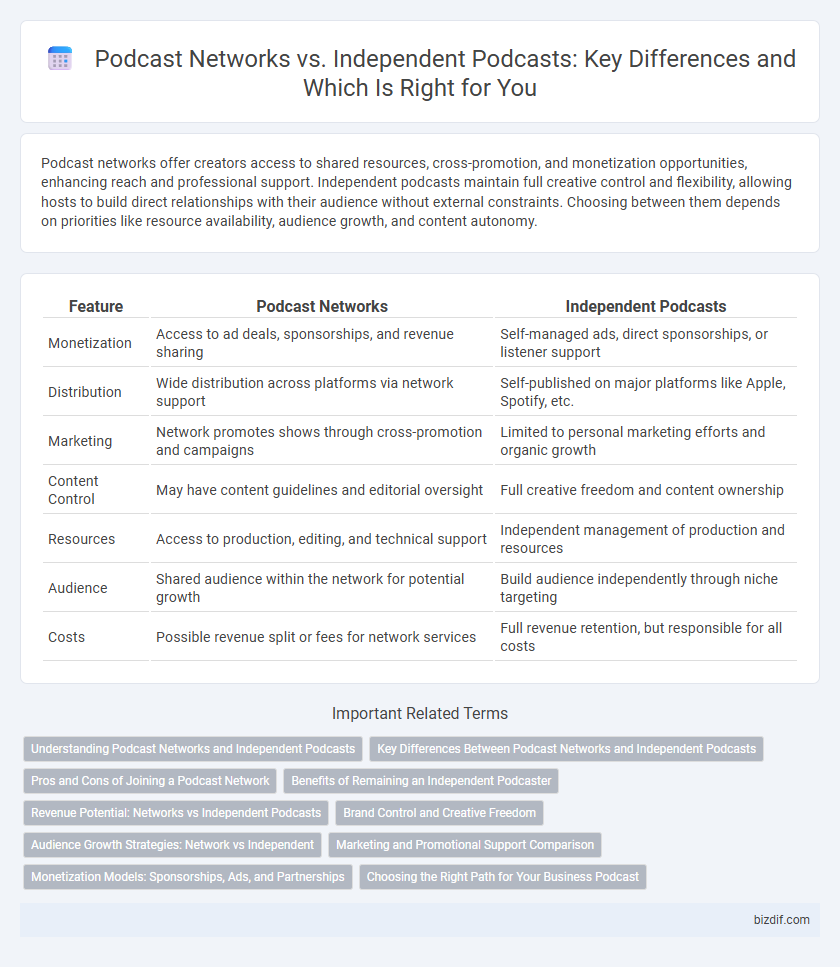Podcast networks offer creators access to shared resources, cross-promotion, and monetization opportunities, enhancing reach and professional support. Independent podcasts maintain full creative control and flexibility, allowing hosts to build direct relationships with their audience without external constraints. Choosing between them depends on priorities like resource availability, audience growth, and content autonomy.
Table of Comparison
| Feature | Podcast Networks | Independent Podcasts |
|---|---|---|
| Monetization | Access to ad deals, sponsorships, and revenue sharing | Self-managed ads, direct sponsorships, or listener support |
| Distribution | Wide distribution across platforms via network support | Self-published on major platforms like Apple, Spotify, etc. |
| Marketing | Network promotes shows through cross-promotion and campaigns | Limited to personal marketing efforts and organic growth |
| Content Control | May have content guidelines and editorial oversight | Full creative freedom and content ownership |
| Resources | Access to production, editing, and technical support | Independent management of production and resources |
| Audience | Shared audience within the network for potential growth | Build audience independently through niche targeting |
| Costs | Possible revenue split or fees for network services | Full revenue retention, but responsible for all costs |
Understanding Podcast Networks and Independent Podcasts
Podcast networks provide creators with shared resources, marketing support, and monetization opportunities, enhancing visibility and audience reach through collective branding. Independent podcasts maintain full creative control and retain all revenue but face challenges in scaling and promotion without network backing. Understanding these differences helps podcasters strategically choose based on goals, resource access, and desired autonomy.
Key Differences Between Podcast Networks and Independent Podcasts
Podcast networks offer collaborative marketing, shared resources, and potential revenue through collective advertising, contrasting with independent podcasts that maintain full creative control and direct audience relationships. While networks provide structured support in distribution, monetization, and cross-promotion, independent podcasters face greater challenges in reaching wider audiences but enjoy complete autonomy over content and branding. The choice between network affiliation and independence impacts scalability, revenue streams, and content flexibility for podcast creators.
Pros and Cons of Joining a Podcast Network
Joining a podcast network offers benefits such as access to professional marketing resources, potential sponsorship deals, and audience growth through cross-promotion with other shows. Independent podcasts maintain full creative control and ownership but often face challenges in funding, marketing, and distribution without the support of a network. Consideration of podcast goals and available resources is essential when deciding between network affiliation and independent production.
Benefits of Remaining an Independent Podcaster
Remaining an independent podcaster ensures full creative control, allowing for authentic content tailored to a niche audience without external influence. Independent creators retain 100% of their revenue streams, enhancing monetization potential through direct sponsorships, listener support, and merchandise sales. Flexibility in release schedules and content experimentation fosters a unique brand identity, fostering stronger listener loyalty and community engagement.
Revenue Potential: Networks vs Independent Podcasts
Podcast networks often provide higher revenue potential through collective advertising deals, sponsorship packages, and cross-promotion, enabling broader audience reach and premium ad rates. Independent podcasts rely on direct monetization methods such as listener donations, merchandise sales, and niche sponsorships, which may limit overall earnings but offer greater revenue control. While networks can scale income via aggregated listener metrics, independents benefit from personalized brand loyalty and flexible monetization strategies.
Brand Control and Creative Freedom
Podcast networks offer creators structured brand control through established marketing channels and audience reach, but this often comes with restrictions on content and format to maintain network consistency. Independent podcasts retain full creative freedom to experiment with style, topics, and branding, enabling unique, authentic connections with niche audiences. Balancing network support and individual autonomy depends on the creator's priorities for growth potential versus personal expression.
Audience Growth Strategies: Network vs Independent
Podcast networks leverage cross-promotion and shared resources to accelerate audience growth, enabling shows to tap into established listener bases and benefit from collective marketing efforts. Independent podcasts rely on niche targeting, organic discovery through SEO optimization, and direct engagement on social media platforms to build loyal, targeted audiences. While networks offer scalability and exposure, independents maintain flexibility and authentic connection with listeners, often resulting in highly engaged communities.
Marketing and Promotional Support Comparison
Podcast networks provide centralized marketing resources, including social media campaigns, cross-promotion opportunities, and access to advertising partners, which significantly enhance audience reach and engagement. Independent podcasts often face challenges in scaling promotional efforts alone, relying heavily on organic growth and personal branding, which limits their exposure. While networks offer structured promotional strategies and analytics, independent podcasters maintain full creative control and direct audience relationships without sharing revenue.
Monetization Models: Sponsorships, Ads, and Partnerships
Podcast networks leverage collective bargaining power to secure higher-value sponsorships, targeted ad placements, and strategic brand partnerships, often resulting in diversified revenue streams and more consistent monetization. Independent podcasts primarily rely on direct sponsorship deals and dynamic ad insertions, which may limit revenue potential but offer greater control over content and advertiser alignment. Both models utilize programmatic advertising platforms, but network affiliations typically enhance audience data analytics, optimizing ad performance and partnership opportunities.
Choosing the Right Path for Your Business Podcast
Podcast networks offer structured support, broader audience reach, and collaborative opportunities, making them ideal for businesses seeking accelerated growth and resource sharing. Independent podcasts provide full creative control and flexibility, appealing to brands prioritizing unique content and individual audience engagement. Evaluating goals, budget, and desired level of autonomy is essential to selecting the optimal path for business podcast success.
Podcast Networks vs Independent Podcasts Infographic

 bizdif.com
bizdif.com